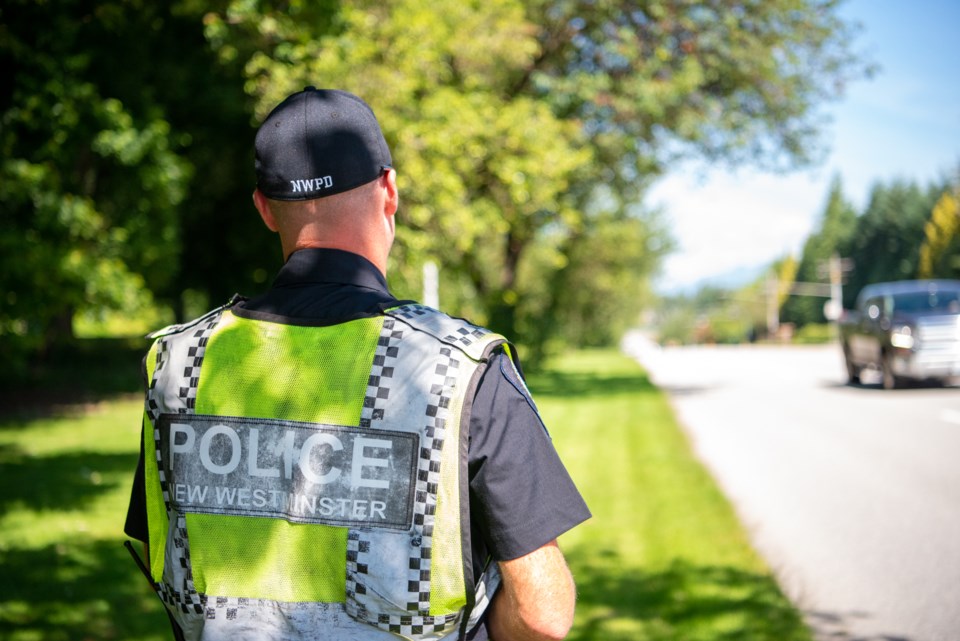New Westminster is hoping to open a conversation with other communities about “bringing equity” to traffic enforcement in B.C.
City council has approved a motion by Mayor Patrick Johnstone seeking the Union of B.C. Municipalities’ support for the provincewide implementation of a means-tested traffic fine system, where fines would be calculated on the basis of the offender’s income.
“As it is right now with flat fine rates, it is an inequitable approach,” Johnstone said. “This approach is very popular in several jurisdictions in Europe where it's been applied. There's no country that's brought this in that has ever gone away from it again and gone back to flat rates.”
Finland, Switzerland, Sweden and the United Kingdom have implemented this type of traffic enforcement system, said the motion.
Johnstone said means-tested traffic fines have enhanced enforcement efforts in jurisdictions, mostly in Europe, where Vision Zero frameworks are in place. (Vision Zero, launched in Sweden in the 1990s, is a strategy aiming to eliminate all traffic fatalities and severe injuries, while increasing safe, healthy, equitable mobility for everyone.)
Johnstone said he’s hoping the City of New Westminster can get the Lower Mainland Local Government Association and the UBCM onboard with efforts to convince the province to introduce means-tested traffic fines in British Columbia.
“Enforcement of dangerous behaviors on the road, be that running red lights, speeding, failing to yield for pedestrians, it's important in our broader goals of road safety. But I’d like to bring equity to our legal system, so the fine not only fits the crime but it provides a more equal incentive to safe driving practices for all members of the community, regardless of their socioeconomic status.”
Johnstone said his idea is one he “shamelessly cribbed” from Saanich councillor Teale Phelps Bondaroff, who presented a motion to the District of Saanich council in January that asked the province to change the fee structure for driving and traffic violations.
When that motion failed to get the support of Saanich council, Johnstone said he asked Bondaroff if he could modify the motion a bit and take it to New West council for its consideration – with the hope of submitting it to the Lower Mainland Local Government Association for consideration as a submission to the UBCM conference.
“It'll be a good conversation at the LMLGA,” Johnstone said Monday.
Bondaroff’s motion didn’t get a seconder in Saanich, but Johnstone’s motion was approved in a 5-2 vote in New West council chambers on Feb. 27.
Coun. Daniel Fontaine said it’s an “interesting concept” but he has a lot of concerns about the proposal. He said someone who is extremely wealthy and drives a Ferrari will require a fine of an “astronomical amount” for it to be a deterrent to.
“If you have lower income, you are going to pay basically nothing for your fine,” he suggested. “So, you have got a situation where wealthier people are still breaking the law, lower income people are being told the fine is almost negligible; there’s no cost to it. So I'm struggling with that conceptually, that whole piece.”
Fontaine, one of two councillors to vote against the motion, said the City of New Westminster levies a variety of fines, and those fines aren’t means tested.
“If the mayor is interested in having this new equitable framework put through on fines, I would have encouraged the mayor to introduce a motion about how we're going to do that here at the city of New West,” he said. “Let's test it out and see if it works. And if it doesn't work, then we'll know. And if it does work, then perhaps we do raise it and bring it up to the British Columbia government and to other jurisdictions.”
Fontaine said he thinks Saanich was “smart” in not moving forward with the issue.
Coun. Jaimie McEvoy said he believes that fines can be a useful tool to influence behaviours, but they have to be of a level that not only impacts people in poverty but people who are well off. He said any amount of fine has an impact on someone with a low income.
“A fine can mean you don't get to drive anymore. If you don't pay that fine, there's consequences. … You could not be able to renew your license or your insurance, if you haven't paid your fines,” he said. “If you're well off, and the fine is low enough, where it's completely inconsequential to you, then for the well off, it's not a big deterrent. But for a low-income person, a fine is always a deterrent, because it can have real impact and it can have consequences.”
Follow Theresa McManus on Twitter @TheresaMcManus
Email [email protected]
📣 SOUND OFF: Do you like the idea of tying traffic fines to income? Would it provide a better deterrent to motorists who disobey the rules of the road? Send us a letter.



